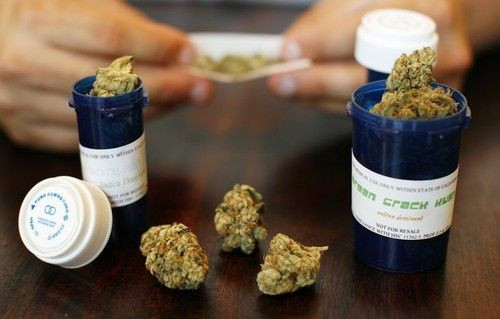Marijuana-Based Pain Medication Seeks FDA Approval

A British company is hoping to receive approval from the U.S. Food and Drug Administration to market a marijuana-based cancer pain medication in the U.S., the first drug of its kind developed from raw cannabis instead of synthetic versions of its active ingredients.
GW Pharma is currently in advanced clinical trials for Sativex, an oral spray derived from delta-9-THC, the main psychoactive ingredient in marijuana, and cannabidiol, a non-psychoactive cannabinoid that has been found to have pain-fighting properties. Sativex has already been approved in Canada, the U.K., New Zealand and multiple European nations for the treatment of spasticity attributed to multiple sclerosis.
GW Pharma hopes to receive FDA approval for Sativex by the end of 2012, The Associated Press reports.
In 1985, the FDA approved the first prescription drugs -- Marinol and Cesamet -- derived from a synthetic version of THC, the naturally occurring component in marijuana, to ease the side-effects of chemotherapy in cancer patients. Marinol, the patent for which expired last year, was eventually approved to stimulate the appetites of HIV/AIDS patients as well.
FDA approval of Sativex could potentially have a monumental effect on the nation's policy regarding medical marijuana. Although 16 states and Washington, D.C. have approved the legal use of medical cannabis with a doctor's recommendations, the U.S. Drug Enforcement Agency still classifies the substance as a Schedule I drug, meaning it has no accepted medical use under federal law.
Aron Lichtman, a Virginia Commonwealth University pharmacology professor and president of the International Cannabinoid Research Society told the AP that there is a disconnect between public opinion and the federal government's marijuana guidelines.
It seems to me a company with a great deal of vision would say, 'If there is this demand and need, we could develop a drug that will help people and we will make a lot of money,' Lichtman said.
Recent polling data indicates a majority of Americans support legalizing medical marijuana, although they do not believe it should be legalized for recreational purposes. In November, a CBS News survey reported 77 percent of respondents said medical pot should be permitted for individuals suffering from serious medical conditions. Meanwhile, another 2010 survey from the Pew Research Center concluded 73 percent of Americans favored the sale of marijuana for medical purposes, although only 41 percent supported full legalization.
Pain Treatment
Various studies have found cannabis could be effective in treating neuropathic pain in cancer patients, spasticity as a result of multiple sclerosis, nausea resulting from chemotherapy treatment and some spinal cord injury patients. The International Association for Cannabinoid Medicines reports there have been 37 controlled studies assessing the safety of marijuana and its naturally occurring compounds in about 2,500 subjects since 2005.
However, the effects of long-term marijuana exposure are still unclear. The strongest argument against the use of medical marijuana is that it may actually accelerate or aggravate the very disorder it is being used to treat, according to Harvard University. In addition, some studies suggest marijuana may weaken the immune systems of sick patients and could damage cells in users' bronchial passages.
In October, the California Medical Association (CMA) became the first state-wide medical association in the country to adopt an official policy recommending the legalization and regulation of marijuana. In a statement, the organization said cannabis' classification as an illegal Schedule I substance has restricted scientists' ability to fully study its health benefits, which can put physicians in an uncomfortable position when they are asked to recommend it to patients.
There simply isn't the scientific evidence to understand the benefits and risks of medical cannabis, said Dr. Paul Phinney, the CMA Board Chair. In order for the proper studies to be done, we need to advocate for the legalization and regulation.
--
© Copyright IBTimes 2024. All rights reserved.





















